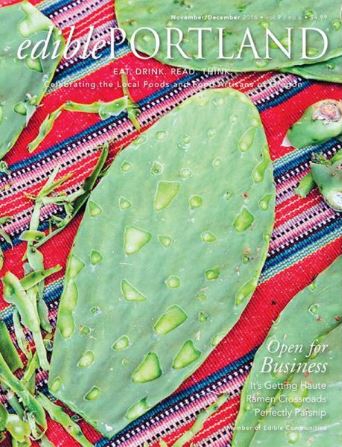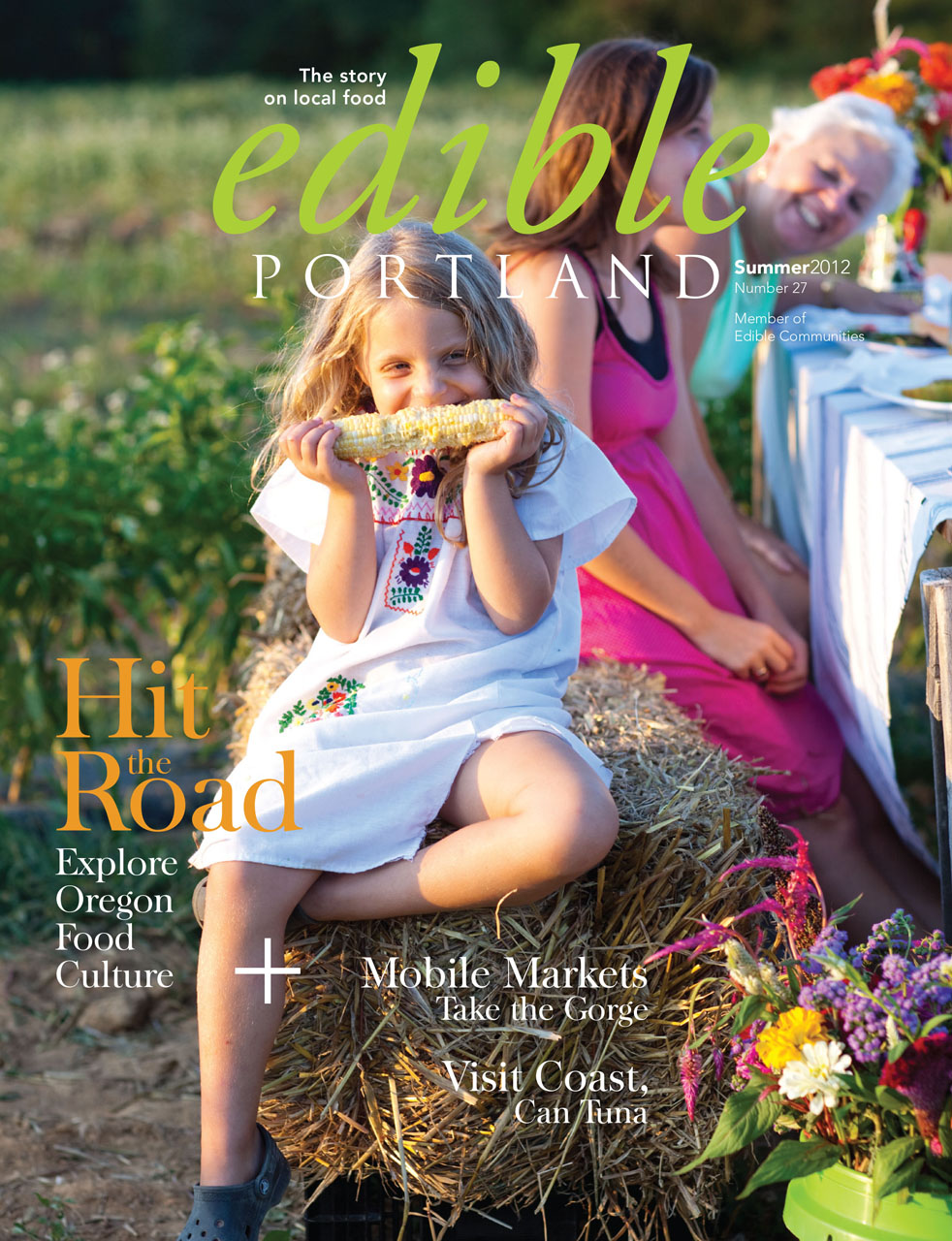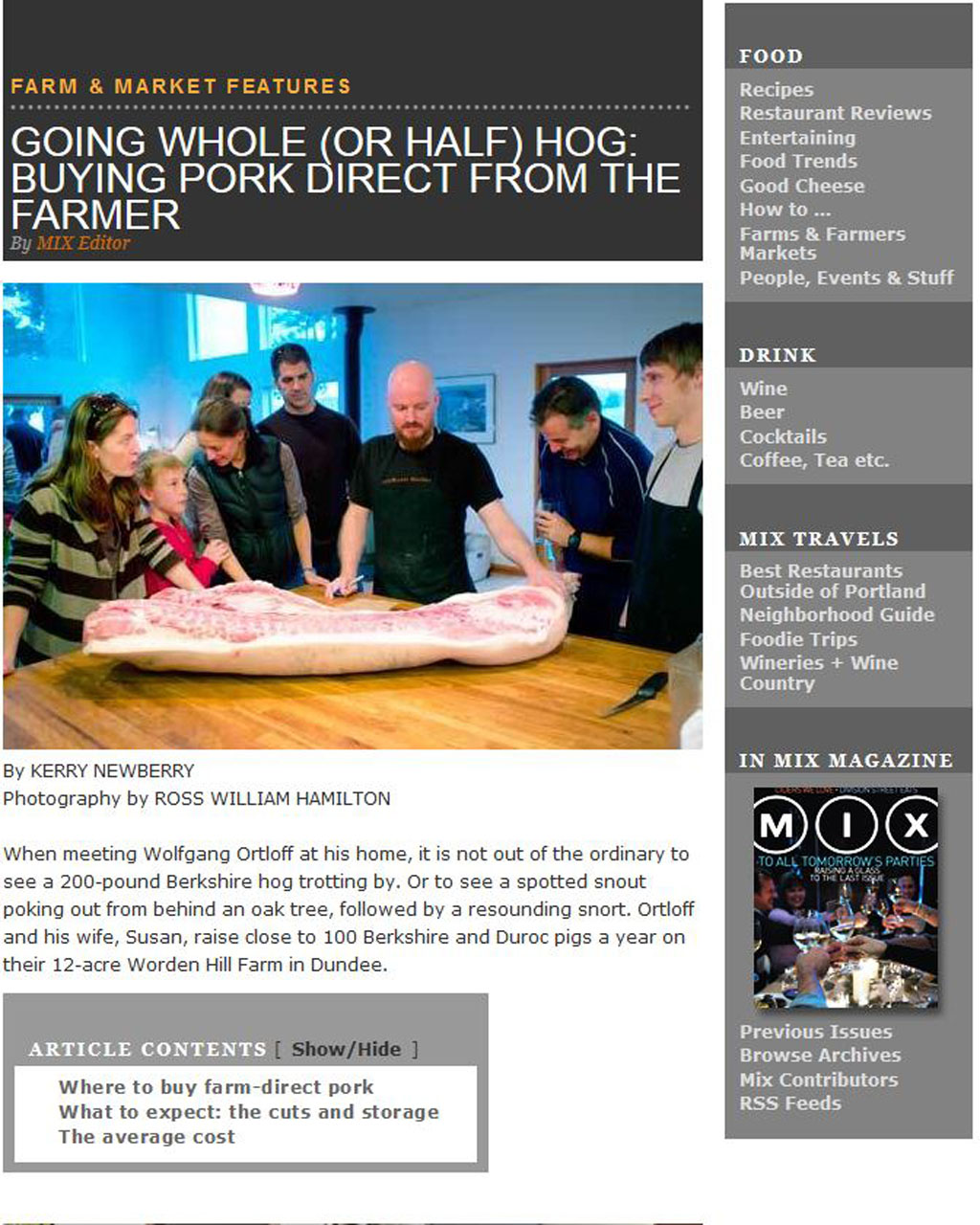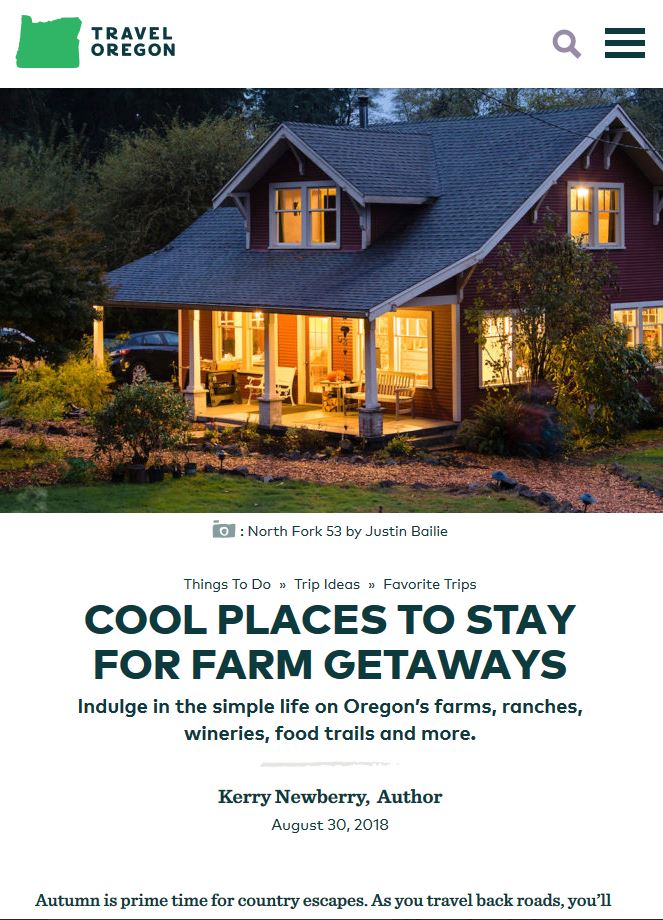Open for Business: Portland Mercado

The Portland Mercado celebrates Latino culture, cuisine, and entrepreneurship, one taste at a time.
Jose Perez leans out the window from his bright turquoise food cart and hands over a towering El Cubano sandwich stacked with layers of ham, roasted pork, Swiss cheese, pickles, and mustard on grilled Cuban bread. “This is what people eat all the time in Cuba,” he says. The ingredients are simple, he adds, and traditional. The secret to the layers of flavor is the blend of spices Perez uses to marinate the pork. “A delicious combination that’s widely used in the Caribbean,” he says.
His all-Cuban menu spotlights classic dishes like ropa vieja (seasoned and braised beef) and papas rellenas (deep-fried stuffed mashed-potato balls). “We are making authentic Cuban food, things my mother used to cook,” says Perez from his compact kitchen. He smiles when he explains the namesake for the cart, Qué Bolá?, a Cuban greeting that translates to, “What’s up?”
Originally from Havana, Perez moved to Oregon in 2003. He had attended culinary school in Cuba, but after facing economic barriers, left to cook in restaurant kitchens in Mexico, Florida, and Virginia. Perez worked as a sous chef for seven years at New Seasons Market before opening Qué Bolá?, one of nine beachy-hued food carts that beckon from southeast 72nd Avenue and Foster Road.
On a brisk, autumn night at the Mercado, the city’s first and only Latino-themed market, the mood is undeniably festive. Globe lights flicker around the perimeter of the patio, and at a neighboring food cart, Qué Bacano, a speaker serenades the crowd with the music from Mañana, hip-swaying Latin pop. Qué Bacano’s menu features traditional Colombian plates, such as arroz con pollo (seasoned chicken and rice) empanadas, yuca frita and almojabanas (rolls made with cornmeal and cheese).
In between a row of carts, a golden Labrador lounges under a bright-red sign that reads: Keep Calm and Eat Tortas. A few feet away, a pack of urban cyclists stand in line at Mixteca. They specifically pedaled across the city to eat Doña Paula’s Tamal Oaxaqueño, a tamale wrapped in banana leaves and slathered with her legendary 15-ingredient sauce. Each of the surrounding carts specializes in a different, regional Latin American cuisine. And really, the most difficult decision here is where to eat.
At Los Alambres, the Hernandez family serves up iconic street food from Mexico City, while at Tierra Del Sol, the husband-and-wife team creates traditional bites from Oaxaca, Mexico. Las Adelas dishes up Mexican comfort food, and Fernando’s Alegria is the go-to for creative burritos and wraps. For a taste of El Salvador, there’s the pupusas and pastelitos at 5 Volcanes, followed by dessert at Don Churro, the newest cart to open at the Mercado.
The community that’s grown around the Mercado is what Perez finds most rewarding this first year. Not just the other food entrepreneurs he works with each day, but the regulars who come back week after week to eat and talk about food and life. The chef is soft-spoken yet animated when he shares some of the traditions of Cuba. “When family comes together, they usually roast a whole pig,” he says. “Then everybody eats together, drinks beer, and plays dominoes.”
The vision of food and dominos brings to mind a quote from writer Deborah Cater: “You have to taste a culture to understand it.” That’s part of the mission of the Mercado, getting transported to another place, experiencing another culture, one plate at a time.
A Long Time Coming
“We recognize that food brings people together,” says Jamie Melton, marketing manager for the Mercado, “and we believe that small businesses and culture are the cornerstones for an integrated and equitable city.” Since launching in spring 2015, the Portland Mercado has grown into a culinary destination, but the heart of the market runs deeper than a collection of food carts and indoor shops celebrating the cuisine and culture of Latin America.
While the overarching mission is to bring diverse cultures together to experience Latin American culture through food, art, and entertainment, the Mercado also acts as a business incubator for Latino micro-entrepreneurs. The initial idea took root over 10 years ago when Hacienda CDC, the Latino-focused nonprofit that supports families with affordable housing, educational opportunities, and economic advancement, was exploring ways to help residents in their housing complex find access to business opportunities and jobs.
In 2006, Hacienda CDC launched Micro Mercantes, a program for women in the community to earn extra income by cooking and selling tamales at local farmers markets. “It was successful and gave us the foundation to build on,” says Melton. After several years, many residents expressed the need for a year-round business to support their families, especially after the economic downturn hit in 2008.
The Mercado grew from that model to fill the demand for full-time affordable retail space for food entrepreneurs throughout the Portland Metro region. The initial design inspiration drew on the traditional mercados around Latin America and learning tours of markets across the nation, like Mercado Centrale in Minneapolis.
“It was a committed group of entrepreneurs that wanted to see a Latin American public market come to fruition,” says Melton. Hacienda CDC spent about five years planning and fundraising the $3.2 million needed for the project, with nearly $1.1 million in loans and support grants from the Portland Development Commission, as well as additional local, foundation, and private-sector dollars. The grant that gave Hacienda CDC the momentum to pursue the project came from the U.S. Department of Health and Human Services in 2012 for just under $800,000.
“It’s now regarded as a national model of how different sectors can work together,” says Melton. In the first year of operating, the Mercado recorded over $2.5 million in sales for 19 small businesses and created 114 new jobs. In total, the Mercado supports over 50 businesses, either selling full time or using the commissary kitchen to bring products to market.
The approach is multi-faceted. In addition to providing affordable retail space to Mercado tenants, Hacienda CDC offers business training and consultation in Spanish and English, financial coaching, and guidance for accessing capital and Kiva person-to-person micro-loans. These services extend to the anchor businesses inside the market hall of the Mercado, and to the micro-entrepreneurs that are part of the Micro Mercantes Incubator and Kitchen.
Micro Mercantes Opens Doors
While the Mercado has a focus on retail and prepared-food businesses that fit into the Latin American Public Market concept, the Micro Mercantes Kitchen is a sister initiative from Hacienda CDC that works to provide affordable space and training for diverse and low-income start-up entrepreneurs who have a wholesale, catering, or farmers market business model.
“The Kitchen represents immigrants and entrepreneurs from all continents and cultures, whereas 90 percent of business owners at the Mercado identify as Latino,” explains Melton. Businesses apply for kitchen space and time—and, if they choose, business-development classes and workshops. As a new immigrant from Cali, Colombia, Andres Felipe of Qué Bacano joined the Micro Mercantes Kitchen program in 2013. For two years he took classes, received guidance on menu development, marketing, and licensing and insurance.
“When Portland Mercado was ready to open in 2015, Qué Bacano was selected as one of the food carts due to the preparedness that Micro Mercantes offered,” says Melton. In 2016, Qué Bacano was able to expand into an open air production kitchen focused on wholesale distribution for their locally produced arepas and almojabanas.
Erick Caravantes also advanced his vision from the business incubator model for Kaah Neighborhood Market — the grocery store he runs with his family in the market hall. Originally from Guatemala, Caravantes moved to Oregon in 1993 due to civil unrest.
Food was always a core part of his culture and family traditions; in Guatemala, his grandparents owned a grocery store, and his parents ran a small business selling foods in a school. Caravantes worked for more than 15 years at Fred Meyer, with the long-term goal of following in his family’s footsteps and opening his own small market.
The affordable retail space provided by the Portland Mercado, paired with business advising and development classes through the Micro Mercantes program set Caravantes on a path to becoming a small business owner. “I like working face-to-face with customers,” says Caravantes, as he pulls out his one-year anniversary sign for the store so he can share a photo of his entire family.
The shelves throughout the store, stocked with hard-to-find imported goods from Latin America, were hand-built by Caravantes and his friends. At the entrance to the grocery, he has a tasting bar for his in-house salsas that he makes in the Micro Mercantes commissary kitchen. The most popular salsa is made with the chile cobán — “It’s a little bit smoky and definitely spicy,” says Caravantes. “The pepper is from my home country.”
Caravantes is currently working on a proposal to have New Seasons Market carry his salsa—the brand name would be “Kaah,” a Mayan word for “neighborhood.”
Collaboration and Connection Powers Entrepreneurship
“Ultimately, our goal is to help businesses become viable and grow,” says Melton. “Whatever it takes to facilitate the dreams of the entrepreneurs here, that’s what we want to do.” Don Felipe Products, producers of artisan chorizo and one of the inaugural businesses at the Mercado, exemplifies the power of dreaming big.
The co-founders, Salud Gonzalez and his partner, Angelica Pizano, moved to the Portland area from Mexico City in 1999. They launched their business in 2012 with support from Alejente Muerdas, a non-profit in Forest Grove that runs a small business development program providing training and marketing opportunities to low-income Latino entrepreneurs in Washington County.
“My dad had the vision of bringing the exotic taste of Mexico to the community,” says his son Mikhail Zepeda. “He started off making chorizo at home for friends and family and always knew he wanted to have his own business.” The green chorizo—pork and beef, spinach, serrano chile, and pumpkin seeds—was their first product and is still the most popular.
Don Felipe is named after Zepeda’s grandfather. And in four short years, the family-run endeavor has expanded from selling at one farmers market to more than six, with year-round outlets at the Mercado and, most recently, Green Zebra Grocery in the Lloyd District. In October, they decided to broaden their outreach even more by focusing solely on wholesale. “The Portland Mercado was a stepping stone and provided us with all the tools we needed to grow to the next level,” says Angelica Pizano.
In the 18 months the Portland Mercado has been running, Melton has seen multiple benefits and success stories emerge from the culturally specific business incubator. “I think having a space where you feel comfortable in your native language makes it easier when you are working 70 hours a week to be able to achieve certain milestones in your business development,” she says. “This is also a space where you can connect with other entrepreneurs. We’ve created a learning community here—people bounce recipe ideas off one another; there’s a lot of collaboration going on.”
Food Brings Us Together
In partnership with the Regional Arts and Culture Council, the Portland Mercado market hall has a permanent artistic display detailing the history of Latinos in Oregon. Signs with statistics illustrate the growth of the Latino population: Oregon experienced the seventh highest growth rate of Latino-owned businesses in the country, jumping 78 percent from 2002 to 2007.
The current featured exhibit, “El Espiritu del Emprendedor,” highlights Latino culture through entrepreneurship in Oregon. It tells the stories of business pioneers like Lucy De Leon & family, owners of Tortilleria y Tienda DeLeon’s; and Jesus Guillen, the owner and founder of Guillen Family Wines. Like the Mercado businesses, these entrepreneurs are shifting the conversation around Latino workers from employee to ownership, and from immigrant to Oregonian.
“The Mercado is about food and beverage and bringing people together, but it’s also about education and openness,” says Melton. The sense of community thrives on any night of the week at Barrio, a lively cantina and bottle shop located inside the market hall, where the wine list caters to white and red blends from South America—and serves only Latin American beer.
In the small, artsy space, bright oil paintings adorn the walls, and at dusk, a chandelier glow warms the room. Owners Chris Shimamoto and Tim Martens had a vision for a social enterprise beer and wine bar. “Our goal is to bring people together in the community. Where the primary activity is not so much drinking as it is conversation,” says Chris Shimamoto. “That’s our north star, a social gathering place.”
To create this hub, Barrio alternates between nights filled with live music, author readings, live comedy, and even crafting. They also donate a percentage of the beverage profits back to Portland Mercado’s Arts and Cultural Programming. Before opening Barrio, Shimamoto worked at Nike for over a decade. Seeking a change, and an independent business idea that would fulfill his pursuit for meaningful connections, he found his way to the Mercado.
As a silvery moon rises, the city’s dinner crowd moves in, buying plates to bring over to the Barrio patio, where Shimamoto coasts between tables, offering wine pairing ideas. The bar is filled with a crowd of diverse backgrounds and ages, listening to an acoustic singer who lives just around the corner. “I’ve traveled all over and I think this place is like going to a hostel, where people from completely different parts of the world meet up for a night and share in the art of conversation over food and drink,” says Shimamoto. “I love that piece. It’s a real community.”
Edible Portland November | December 2016
Click here to read on the Edible Portland website http://edibleportland.com/american-dream/.




